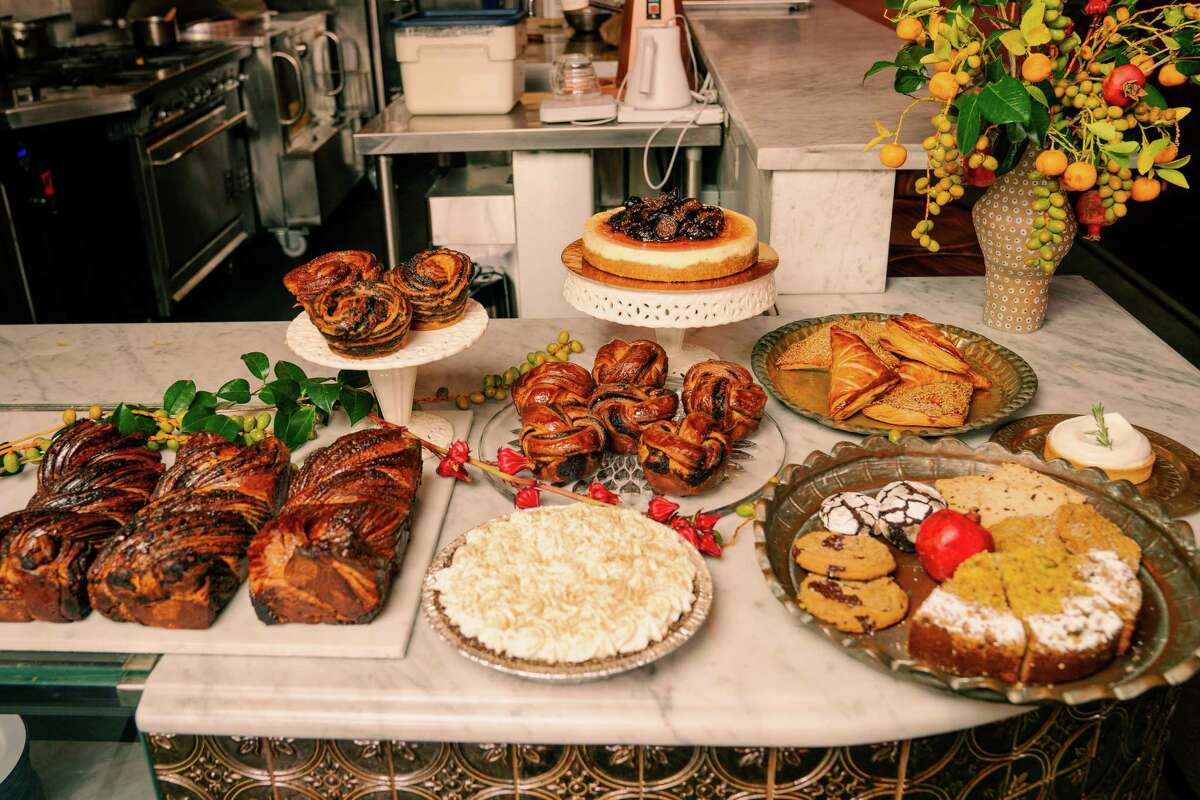When Tal Mor was growing up in Cupertino, his father would scout out the loquat trees in the neighborhood and go pick the fruit that would otherwise be left to rot.
Mor found his father’s behavior embarrassing. Still, he appreciated the reason for it.
“In Israel they were sold in markets, here they were left to rot?” he said. “This was one of those immigrant experiences as a kid that stuck with me.”
Embarrassing it might have been, but the memory was strong enough that it inspired the name of his new Jewish bakery in San Francisco. Loquat opened last month on Gough Street in the Hayes Valley space that formerly housed 20th Century Café.
Mor, a partner in Four Barrel Coffee and the Mill, was born in Israel and has many food memories associated with the five years that he lived there. And his new venture has items commonly found in Israel, including borekas and babka. But he does not consider Loquat an Israeli bakery.
“Israel is a relatively small piece of the Jewish story,” Mor said. Rather, he hopes the bakery can offer an education — and a delicious one at that — in the foods from the Jewish diaspora, particularly from the Arab world.
“Many people don’t even know that Arab Jews exist,” he said.
Mor’s father came from Baghdad, and his mother is Ashkenazi with several generations of family from Jerusalem. Some of his favorite food memories grew out of his parents’ mixed marriage. Of the two, for example, only his father loves amba, the piquant Iraqi pickled mango sauce. Both parents are excellent cooks, Mor said. His father would make traditional Iraqi foods such as kubbeh (an Iraqi beet and beef soup) and sambusak (similar to borekas), while his mother made excellent cakes, filled either with fruit or poppy seeds.
Mor got his start in the food industry in the cafés of New York City, following an unhappy period working in the film industry. The food trail led him to Portland for a stint and, eventually, to San Francisco to roast and source coffee for Four Barrel.
During the pandemic, he and his business partner, Jodi Geren, would take walks through the Mission District. They both missed the community around café culture. They began thinking about opening a bakery, “one that smelled divine and felt like home,” Mor said, “one that you’d be swept into from blocks away by the inviting sounds and the creative energy, both of the products being made and also the folks inside.”
Around that same time, their friend Michelle Polzine, owner of 20th Century Café, reached out to them. She was looking to close and wanted to know if they might be interested in the space. Mor and Geren jumped at the opportunity.
They hired pastry chef Kristina Costa of Tartine bakery to start developing a pastry program. Then they began test-selling items at Four Barrel Coffee in the Mission and the Mill café in NoPa and soliciting feedback. Both places will carry their baked items going forward, joining Black Bird Bookstore and Café in the Outer Sunset.
Mor said the recipe testing for the babka alone took the better part of last year (it takes three days to make). While some items, including feta, are imported from Greece, they are sourcing a lot locally as well; their ricotta comes from Petaluma’s Double 8 Dairy, and the eggplant is from Capay Valley’s Full Belly Farm.
On a recent tour, Mor showed me the room in Loquat dedicated to borekas and babka, where the laminated dough is made, while Costa, who is of Hungarian-Jewish and Greek descent, showed me her jars of raspberry-blackberry jam. Some will go to the Mill, but a large amount of jam will be used for sufganiyot come Hanukkah next month.
Loquat just opened, so other items and ideas have yet to be rolled out. The partners plan to offer a sourdough challah soon, “and we’ll be sourcing some special local and heirloom flours for these. One specially came from seedstock that was found in the temple of Masada,” Mor said.
They have a tandoor oven to bake Iraqi laffa (bread for wraps), and they plan to have occasional sabich nights, celebrating the popular Iraqi-Israeli eggplant sandwich.
“We also always offer a borekas platter with haminados [Sephardic-style cooked eggs], Greek feta, harissa, z’hug and olives,” he said.
Mor generously sent me home with two boxes full of pastries to try, and while everything was delicious, a few were standouts. The dough on the borekas was so light and flaky it was, dare I say it, perfection (I tried the eggplant feta and spiced potato varieties). Of the three babka buns, cinnamon-sugar, salted chocolate and poppy seed, I surprised myself by liking the poppy seed best: truly outstanding, and the babka dough has a faint whiff of sourdough from the fermentation process.
One of the most unusual and surprising tastes was a mahlab cake; mahlab is a Middle Eastern spice made from the pits of wild cherries. The cake had a light-pink glaze, which turned out to be from sour cherry vinegar. Made from almond and pistachio meal, it tasted of rosewater and cardamom (and happens to be gluten-free). There was also a lemon tart that wasn’t just a lemon tart; the dreamy texture was made from preserved lemons, and the cream on top was fragrant with rosemary.
by Alix Wall













0 Comments